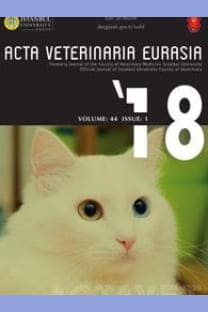VETERİNER FARMAKOLOJİ VE TOKSİKOLOJİDE TRANSPORT PROTEİNLERİ
ÖZET Aktif taşıma, ilaçların dağılımında önemli yolaklardan biridir. Konsantrasyon farkına karşı olan bu tip geçişte endotel ve epitel hücrelerin her iki yüzünde bulunan spesifik taşıyıcı proteinler görev alır. Taşımaya aracılık eden proteinler ABC (ATP-binding Casette Family) ve SLC (Solute Carrier family) süper ailesi olmak üzere 2 büyük gen ailesi tarafından kodlanırlar. Bu proteinlerin hücresel lokalizasyonları, yapıları ve fonksiyonları özellikle knock-out farelerde gösterilmiştir. Taşıyıcı proteinlerden ABC Süper ailesi üyesi olan P-glikoprotein, ilk olarak kanser ilaçlarına karşı dirençli tümör hücrelerinde tanımlanmıştır. P-glikoprotein'in endojen maddelerin taşınmasına aracılık ederek fizyolojik proseslerde rol aldığı ve yaşamsal öneme sahip olduğu belirlenmiştir. Ayrıca bu proteinlerin ilaç farmakokinetiğinde de önemli rol oynadıkları gösterilmiştir. Bu yazıda mümkün olduğunca veteriner pratiğe yönelik örneklerle; emilim, dağılım, metabolizma ve atılım sırasında aynı taşıyıcı proteine yarışma nedeniyle oluşabilecek farmakokinetik etkileşmeler açıklanmaya çalışılacak böylelikle veteriner farmakoloji ve toksikoloji yönünden öneme sahip ilaç ve zehirlerin farmakokinetiğinde taşıyıcı proteinlerin rolü vurgulanacaktır. Anahtar Kelimeler: taşıyıcı protein, veteriner, farmakoloji, toksikoloji TRANSPORT PROTEINS IN VETERINARY PHARMACOLOGY AND TOXICOLOGY ABSTRACT Active transport is one of the important process for drug dispositions. Specific membrane transporters serve as a carrier for both surface of epithelial and endothelial cells membrane at the active transport which is against to concentration gradient. These transport proteins are coded by two major super gene family called ABC Super family (ATP-binding family) and SLC Super Family (Solute Carrier Family). These proteins' cellular localization, structure and function are demonstrated at recent investigations especially on knock-out mice. For the first time P-gp, is a member of ABC super family, was described in tumor cells which have resistance against the antineoplastic drugs. It is shown that P-gp has a vital role at physiological process by transporting endogen molecules. Furthermore, it has been shown that it has an important function at the pharmacokinetic of xenobiotics. At this review we will focus on pharmacokinetic interaction that could be occur in absorption, distribution, biotransformation and elimination, because of competition for binding to same transport protein with examples related to veterinary practices as far as possible. Thus, the role of transport proteins in pharmacokinetics of drugs and toxins which have veterinary importance will be underlined Keywords: transport protein, veterinary, pharmacology, toxicology
Anahtar Kelimeler:
taşıyıcı protein, veteriner, farmakoloji, toksikoloji
- ISSN: 2618-639X
- Başlangıç: 1975
- Yayıncı: İstanbul Üniversitesi-Cerrahpaşa
Sayıdaki Diğer Makaleler
RUMİNANTLARDA SÜT PROTEİNLERİ VE POLİMORFİZMİ
EVALUATION OF ANTIBODY LEVEL AGAINST E. COLI K99 IN COLOSTRUM OF COWS IN SUBURBS OF TEHRAN, IRAN
Fereydon REZAZADEH, Ahmad MORSHEDI, Mohammad RABBANI, Taghi ZAHRAEI SALEHI, Mohammad MOKHBER DEZFOULI
VETERİNER FARMAKOLOJİ VE TOKSİKOLOJİDE TRANSPORT PROTEİNLERİ
